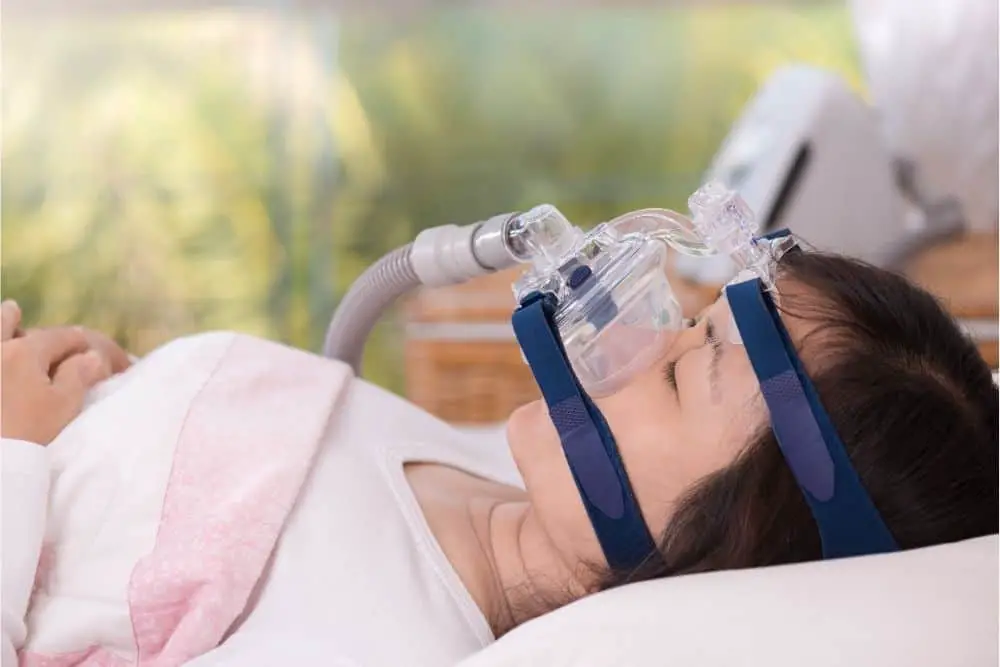If you have sleep apnea, vacationing can be quite a stressful idea, especially if you’re still getting used to CPAP therapy or are unsure about how CPAP machines work. This can cause even more stress if you’re someone who loves to camp or has always enjoyed off-grid vacationing.
Unfortunately, a lot of standard CPAP machines are built for home usage and are not very portable, as well as requiring a power outlet to function.
This can make finding a campsite difficult, and require you to stay on or near to the power grid which will limit the places you’re able to camp.
Thankfully, the latest designers of CPAP machines have developed several great options to make camping easier than ever before, to maximize the relaxation and convenience of your next camping trip.
Featuring a lot of the features you’ll find on your home machine, these travel-focused CPAP machines are lightweight and compact enough to be carried easily and won’t take up too much space in your rucksack.
They are able to provide you with the therapy you need, using the latest battery designs in order to function perfectly even while you’re totally off the grid.
This will allow you to get back to planning your next amazing adventure or hidden getaway, without having to worry about finding a power outlet every night.
If you have questions about the features mentioned in this article or about sleep apnea, CPAP machines, and how to travel with them safely, please feel free to check out our buyer’s guide and FAQ located at the bottom of this review.
OUR RATING
One of the best-looking CPAP machines available, the Philips Respironics DreamStation is an incredibly light and compact machine packed with features.
The first thing to note is just how sleek and well-designed this machine is.
The display is clear and easy to navigate which is handy for usage in the low light conditions of a campsite or tent, enabling you to set your machine up as easily as you would at home. This also makes monitoring your sleep and any events easy and clear.
It also comes with several great features to ensure you sleep as comfortably in the wilderness as you do at home, featuring leak compensation, pressure ramping as well as exhalation pressure relief.
All these will help you to customize your therapy and make it as comfortable as possible, even for newer users unused to CPAP therapy.
The thing that makes the DreamStation so well suited to camping though is the optional overnight battery that can be purchased separately.
This battery is really high quality and allows for a maximum of 10 hours of continuous therapy anywhere, making it perfect for long flights or trips that take you off the grid.
The amazing thing is that all these features are packed into a container measuring just 5.9”x5.9”x2.3”, and weighing 1.9lbs.
This makes the DreamStation super easy to pack into your daysack and weighs less than a few cans of soda. With a sound rating of 30.7dBA, the DreamStation is also very quiet, which will help to ensure uninterrupted rest for you and anyone sharing your campsite or tent.
Pros:
Cons:
OUR RATING
Human Design Medical has released some very popular travel-friendly CPAP machines over the years, and the Z2 Travel auto is the latest and most refined version. This is one of the lightest and smallest CPAP machines available, that doesn’t compromise on features or performance.
The thing that immediately stands out is the size of this machine, measuring just 6.48”x3.3”x2” and weighing just 10.4 oz. This will make packing and carrying this machine nearly unnoticeable, making it perfect for hiking, camping, and heading off the grid.
While small, the Z2 doesn’t compromise on performance at all. This machine provides leak compensation, pressure ramping, exhalation relief, and a built-in humidifier, which adds up to an amazingly comprehensive therapy package.
The menu is easy to navigate, as is the interface, however, you can also use its built-in Bluetooth connectivity to see details about your sleep using the NightLog app on your cell phone.
The decibel rating of 26 is impressively quiet and makes it the quietest machine on this list, meaning the only thing disturbing your sleep will be any curious wildlife.
Again, this is another machine that has batteries available for off-grid use, including the extended battery pack and PowerShell module which can both provide long-lasting therapy. Just make sure you’re able to charge them after use.
Pros:
Cons:
OUR RATING
The ResMed AirMini really lives up to its name, measuring just 5.4”x3.3”x2.1” and weighing just 10.6 oz.This makes it comparable in size to a smartphone, a seriously compact package that will easily fit inside your luggage without needing to worry about it weighing you down.
While the profile of this CPAP machine is light, the feature list is most definitely heavy and has everything to help you camp with confidence. Features include pressure ramping, EPR (Expiratory Pressure Relief), and leak compensation.
There is also the option to use waterless humidification (sold separately) as well as a DC/DC converter (sold separately), allowing you to plug this CPAP into your car or RV and also a powerful battery also sold separately for total off-grid use.
The ResMed is very quiet with a decibel rating of 30, and also has Bluetooth connectivity to let you monitor the details of your sleep easily.
The only drawback is that the ResMed doesn’t have a built-in screen for instant interfacing, and may be a little less portable if you choose to add a few of the additional accessories to the package.
Pros:
Cons:
OUR RATING
The Transcend 3 miniCPAP is another feature-rich machine that comes in an extremely compact package, making it ideal for traveling and camping.
Measuring 4.33”x3.15”x1.66” and weighing 1.1lb the Transcend 3 is a very manageable and portable size that won’t take up much space in your bag or your tent and will be nearly unnoticeable in terms of its weight.
The Transcend 3 is able to maintain a small profile due to its omission of a built-in humidifier, however, if this is something you want Transcend also offers the 365 version that has one.
The Transcend 3 does house many great features in its small body, including leak compensation, exhalation pressure relief, and pressure ramping to help inexperienced users or those who find CPAP uncomfortable to get the rest they need while away from home.
With a decibel rating of 30dBA, it isn’t the quietest machine on our list but is very quiet nonetheless, which will help users to remain calm and undisturbed in the wilderness.
Pros:
Cons:
OUR RATING
The APEX Medical XT Auto offers great performance and value to travelers who need all the features modern CPAP machines provide without sacrificing too much space in their luggage.
Measuring just 5.7”x5.1”x3.9” and weighing 1.76lbs, the APEX is compact and manageable in size and is easily capable of fitting in the palm of your hand.
The APEX Medical does come with a few excellent features that help it to stand out, however, including a super quiet 28 decibel sound rating and a clear LCD display to aid in easy use and setup.
This will enable you to rest without disturbing yourself or other campers, and also gives the ability to check your settings easily during low light conditions.
The pressure variation algorithm (PVA) and ramp pressure feature allows inexperienced users to set their machine up for maximum comfort, gradually building to their prescribed air pressure.
The power supply for this machine is also built into the main body of the case to remove burdensome power bricks and cables, making stowage and carrying easier with fewer parts to keep track of.
The major drawback of this CPAP machine is that there is no battery compatibility, meaning that you will be limited slightly to where you can camp overnight and will require a power outlet to use it.
Pros:
Cons:
Buyers Guide
If you’re someone who loves being outdoors, traveling, and exploring then camping is going to be an essential part of your lifestyle.
There’s absolutely no reason why you should have to forfeit the psychological and physical benefits of camping and the outdoors if you suffer from sleep apnea. Thankfully there are many great CPAP machines that have been designed with portability and off-grid use in mind.
Whether you’ve just been diagnosed with sleep apnea or are in the market for a smaller, more convenient CPAP machine, there is a lot to know about these machines. As new features emerge there can be a lot to keep track of even for long-time CPAP users.
In this buyers guide, we’re going to highlight some important features that CPAP machines provide, as well as an FAQ to answer some common questions that may put your mind at ease.
Size/Weight
When it comes to travel-friendly CPAP machines, portability is everything. The lighter the machine, the easier it is to pack and carry, making life far easier when traveling.
A lot of CPAP machines designed for traveling are lightweight, however, some can become a bit heavier if you decide to add a battery or additional accessories such as an optional humidifier.
The addition of these accessories may affect portability and weight slightly, but they will still be very convenient and designed specifically for use with the machine you decide to use.
DC Battery Compatibility
Always check that your CPAP machine is battery compatible, as there are some designs that aren’t.
Being able to use a CPAP without needing to use an outlet is a great quality of life improvement for traveling, and batteries are so advanced nowadays that they can often last for the duration of an entire flight (depending on the route).
Just be sure to charge your battery, or carry enough spares to ensure you can maintain therapy for the duration of your camping trip.
Noise
CPAP machines are sound rated to ensure users can find a machine that won’t disturb their sleep.
The lower the decibel rating the better, as your machine will be less likely to frustrate you or anyone else sharing your camping spot.
Display
A quality display will make using your CPAP in low light conditions far easier, and help you monitor details and get set up as conveniently as possible.
Frequently Asked Questions
What does CPAP mean?
CPAP means Continuous positive airway pressure. This is the treatment for various types of sleep apnea.
CPAP machines keep user’s airways open using a continuous stream of air pressure, keeping the airway open and preventing apnea events.
What are the side effects of using a CPAP machine?
There are a few side effects to using a CPAP machine, but some may suffer no side effects at all.
Some side effects include;
- a dry nose/throat
- sneezing and congestion
- Irritation
- abdominal bloating (can occur if the pressure is too high and air manages to enter the stomach)
- Nosebleeds, though these are rare
What is the ramp feature?
Pressure ramping allows users to incrementally increase airflow to help them fall asleep before they reach prescribed pressure.
Does CPAP stop snoring?
While CPAP can prevent snoring, this isn’t guaranteed.
If you are someone that snores we recommend you see a physician to ensure you don’t have sleep apnea.
What is a Humidifier?
A humidifier moistens the filtered air a CPAP machine pumps, helping prevent dryness in the user’s throat and mouth.
There are several types of humidifier including;
- Built-in humidifiers which are enclosed within the main design of the machine.
- Heated humidifiers which increase the efficiency of the humidification
- Integrated humidifiers which are sold separately and are often of a proprietary nature, connecting to a specific brand of CPAP machine.
- Waterless humidifiers which work by using the natural water vapor a user exhales to humidify the air for their next breath.

Damon Wiseley is a Registered Respiratory Therapist and Certified Pulmonary Function Technologist.





